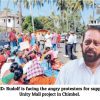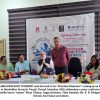Goa is abuzz with excitement as vintage bike and car owners, users, collectors and fans are decking […]

CANCER SCREENING: Your superpower in the fight against cancer
LAW October 17, 2025By Dr Amit Dias
CANCER, for many years, that single word felt like a death sentence. It was a formidable health challenge, deeply personal, and often associated with dread. But today, the narrative is changing. Thanks to breakthroughs in science and a relentless focus on early action, cancer is transforming from an inevitable destiny into a manageable challenge. It’s no longer a sentence—it’s just a word, and we are learning how to disarm its impact.
This Breast Cancer Awareness Month, let’s talk about the most powerful tool we possess in this fight: the power of screening. Recognizing the immense potential of early detection, the Government of Goa, for example, has spearheaded innovative projects to bring screening facilities closer to home, actively reducing the burden of disease on its community.
The Global Scope: Understanding the Challenge
While the story of hope grows stronger, we must acknowledge the sheer scale of the global challenge. Cancer remains one of the leading causes of death worldwide. According to 2022 estimates from the World Health Organization (WHO) and the International Agency for Research on Cancer (IARC), the year saw an estimated 20 million new cancer cases and a heartbreaking 9.7 million deaths. These numbers translate to a sobering reality: approximately one in five people will develop cancer in their lifetime .
Globally, the three major cancer types are lung, female breast, and colorectal cancers. The impact is gender-specific: for women, breast cancer is both the most commonly diagnosed cancer and the leading cause of cancer death, while for men, the most common is lung cancer, followed closely by prostate and colorectal cancers. This significant burden is mirrored in national data, underscoring the urgent need for proactive health measures like screening in India and across the globe.
The Lifesaving Secret: Screening and Early Detection
So, what exactly is screening, and why is it so vital?
Screening simply means checking your body for cancer or pre-cancerous cells before you even notice any symptoms. It is a critical public health strategy because it radically changes the outcome of the disease. When we catch cancer early, we unlock three critical advantages:
- More Curable: Early-stage, localized cancers boast significantly higher five-year survival rates—often exceeding 80% for many types—compared to cancers diagnosed after they have advanced and spread (metastatic stage). Catching it early moves the odds decisively in your favor.
- Treated with Less Invasive Methods: Earlier diagnosis allows doctors to select less diverse and less invasive treatment options. This reduces the physical toll on the patient, minimizes recovery time, and lessens the psychological impact of aggressive interventions.
- Less Costly: Logically, less intensive treatment often translates to less costly interventions, reducing the financial strain on individuals and the healthcare system overall.
When you combine timely screening with modern medical advances—such as molecular diagnostics, targeted therapies, and precision medicine—you create a powerful shield. These innovations mean that many cancers, if detected early, can not only be successfully treated but often cured entirely.
Your Daily Vigilance: Knowing the CAUTION Signs
While screening is for individuals who feel perfectly healthy, awareness of symptoms is crucial for everyone. Persistent and unexplained changes in your body should always prompt an immediate consultation with a healthcare provider.
A helpful way to remember the seven most common warning signs is using the mnemonic CAUTION:
• Change in bowel or bladder habits.
• A sore that does not heal.
• Unusual bleeding or discharge.
• Thickening or lump in the breast or elsewhere.
• Indigestion or difficulty swallowing (Dysphagia).
• Obvious change in a wart or mole (following the ABCDEs of melanoma).
• Nagging cough or hoarseness.
By embracing both the proactive step of scheduled screening and the daily vigilance of the CAUTION signs, you take control of your health narrative.
Breast Cancer Awareness: The Role of Breast Self-Examination (BSE)
Though not a substitute for clinical screening tests like mammography, Breast Self-Examination (BSE) is important for breast awareness, helping women to become familiar with the normal look and feel of their breasts so they can spot changes immediately. The best time for BSE is usually one week after the menstrual period ends.
Steps for Breast Self-Examination:
- Visual Inspection (Mirror): Stand in front of a mirror with arms at your sides, then hands on hips pressing inward, and finally with arms raised overhead. Look for changes in size, shape, symmetry, skin texture (dimpling, puckering), or changes in the nipple (inversion, discharge).
- Manual Examination (Lying Down or Shower): Use the pads of the three middle fingers to feel the breast tissue. Use three different pressure levels (light for tissue closest to the skin, medium for deeper tissue, and firm for tissue near the chest and ribs).
- Pattern: Use a methodical search pattern (like vertical strips or concentric circles) to cover the entire breast from the collarbone to below the breast, and from the armpit to the middle of the chest bone.
- Nipple: Gently check for any discharge.
Recommended Cancer Screening Tests
Cancer Type Global Significance Primary Detection/Screening Methods
Female Breast Cancer: Most common cancer diagnosed and leading cause of cancer death in women. Mammography, clinical and self-examinations.
Lung Cancer Most common cancer diagnosed and leading cause of cancer death in men. Low-dose CT scans (for high-risk individuals).
Colorectal Cancer: Third most common cancer overall globally. Colonoscopy, sigmoidoscopy, stool-based tests.
Prostate Cancer: Second most common cancer diagnosed in men. PSA blood test, digital rectal exam (DRE).
Liver Cancer: A major global cause of cancer mortality. Screening often targets high-risk groups (e.g., those with Hepatitis B/C). Ultrasound, Alpha-fetoprotein (AFP) blood test.
A Message of Hope and Action
Cancer may change your life, but it doesn’t define it. Thanks to scientific progress, we have the tools to finish the fight before it even truly begins. Early detection is a testament to the fact that we can, and must, be proactive stewards of our own health.
“The best time to plant a tree was 20 years ago. The second best time is now.” This timeless wisdom applies to your health. Don’t wait for symptoms. Knowledge is power, and action is your shield. Take your life in your hands—schedule your screening today.
You are stronger than you imagine, braver than you believe, and more deeply loved than you know.















